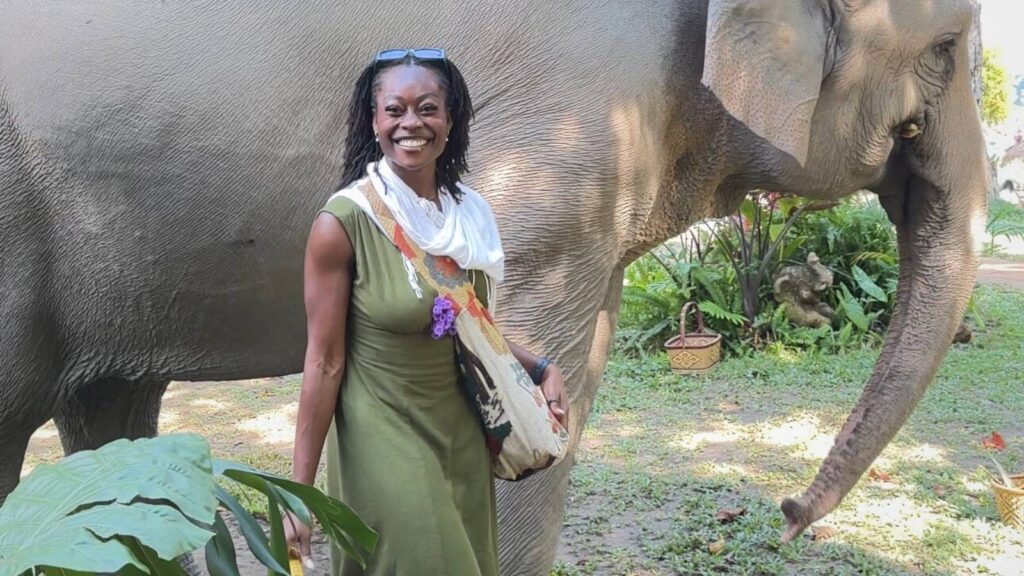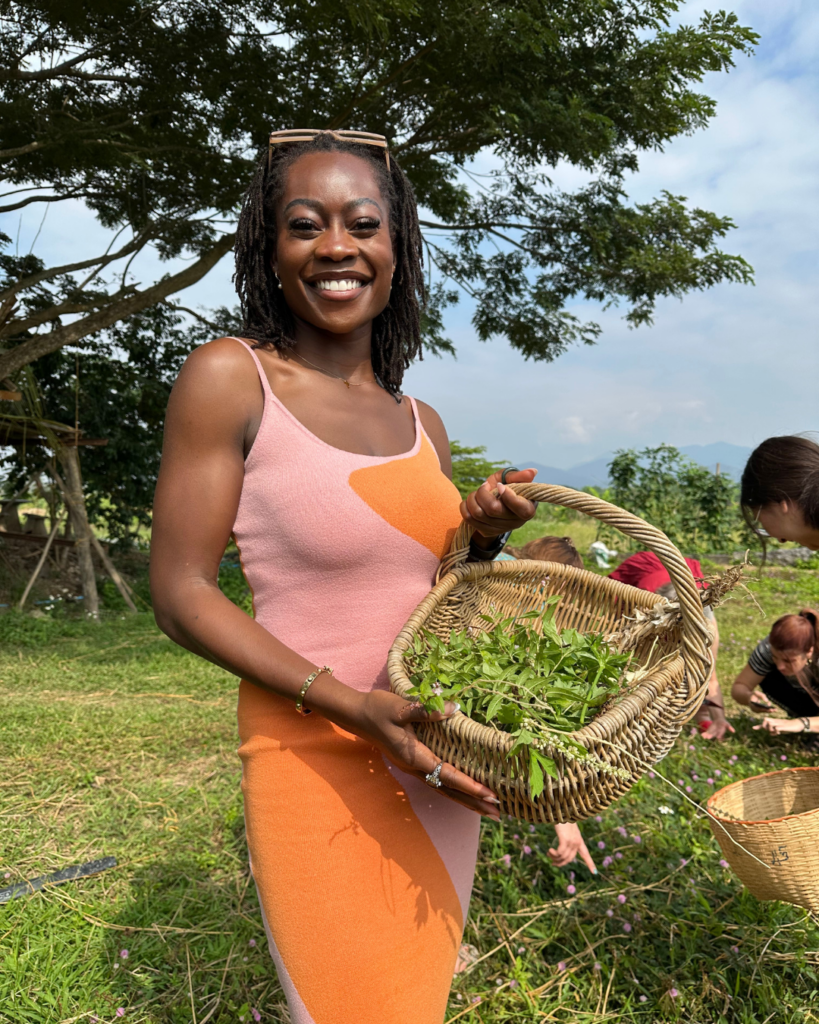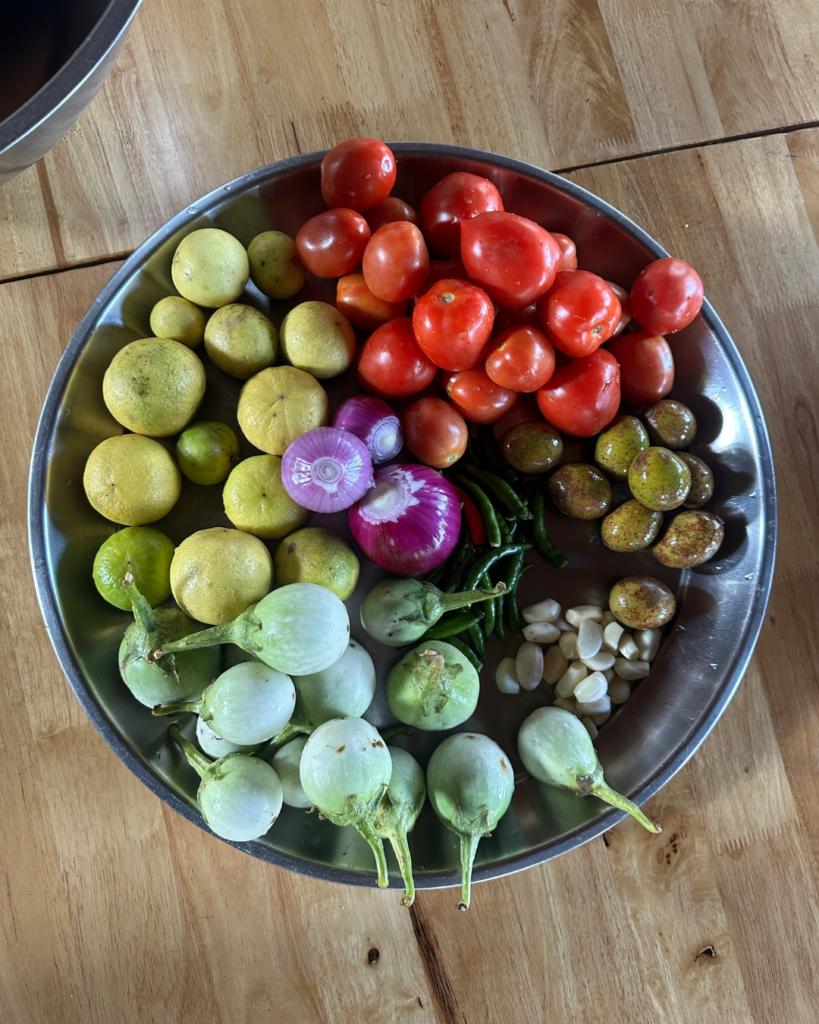Temilola Adedipe envisions a future that merges biomedicine and ancient healing for community-centered care.

The National University of Natural Medicine (NUNM) runs the Thailand Global Health Experience each year, alongside various travel destinations. Cultural immersion opportunities are open to both degree and non-degree seeking students.
Temilola Adedipe envisions a future where traditional and modern medicine can thrive together—especially when it comes to providing culturally responsive care.
In January, Adedipe returned with her student cohort from a two-week study abroad trip to Chiang Mai, Thailand, led by the National University of Natural Medicine (NUNM) in collaboration with local partners.
As a dual degree student in the Doctor of Naturopathic Medicine and Master of Science in Global Health programs at NUNM, she said Thailand stood out as a country where ancient and contemporary medicine have been successfully integrated.
Born in Nigeria and raised in the United States, Adedipe says her perspective on healthcare was shaped by her family’s legacy and academic journey in biomedicine.
Her grandfather, an herbal farmer, taught her parents to value plant medicine and traditional Yoruba healing practices. Frequent family trips to Nigeria reinforced her own connection to those traditions, as well as opened her eyes to the cross-cultural divide that can exist.
“During these visits, I observed stark healthcare disparities between these two worlds,” Adedipe recalls, “particularly when my aunt passed away in 2012 due to inadequate medical care in Nigeria.”
This personal loss led her to obtain her bachelor’s degree in biomedical engineering from the University of Texas at San Antonio in 2020, where she focused on regenerative medicine and cellular biology mechanisms to explore the body’s natural ability to heal.
Since then, Adedipe has worked with a medical software company to improve clinical imaging with AI, and founded a business to connect Black-owned clean beauty brands with cosmetic chemists for FDA compliance.
After more than 500 hours of clinical training, she notes distinct challenges in the U.S. healthcare system—“physicians constrained by brief appointments” and “widespread prescription dependence without exploration of natural, evidence-based alternatives”.

On her recent stay in Thailand, Adedipe was reintroduced to the value of community to address acute and preventative care—an idea that continues to shape her long-term career vision.
“Thailand’s innovative approaches to food accessibility, community-based health infrastructure, and seamless integration of whole-person wellness practices have provided inspiration for my future endeavors,” she said.
After she completes her degrees at NUNM, Adedipe said she plans to channel these experiences to bridge the healthcare gap in Nigeria.
By creating an integrative health center, as well as a research institute to study healing through plant compounds, she aims to unite modern diagnostics with traditional practices to promote lasting solutions.
In her own words, NUNM medical student Temilola Adedipe shares how her trip to Thailand reinforced her belief in blending ancient wisdom with biomedical innovation to advance community and global health.
This experience surpassed my expectations in nuanced and compelling ways. Thailand’s seamless incorporation of traditional healing practices into everyday life revealed a healthcare philosophy fundamentally different from Western medicine’s compartmentalization.
As our acupressure teacher Remco articulated, “In Thai culture, mental health and physical health are one. They affect each other and we have to take care of both.”
What I learned from this experience can be distilled into a few key takeaways:
First, I was particularly intrigued by Thailand’s approach to urban planning as an extension of healthcare infrastructure. Fruit trees grow throughout Chiang Mai, in a city design that facilitates nutritional security and public health. Witnessing banana trees flourishing in what might be considered “incompatible spaces” in the West, revealed how Thailand prioritizes food accessibility as preventative medicine—a stark contrast to America’s food deserts. Walking daily into gardens to harvest fresh herbs, vegetables, and fruits creates a direct connection between nature and nourishment, with an emphasis on diversifying plant foods in meals, showcasing how dietary practices can become an extension of medical care through urban design.
Also, after years of avoiding beef in the U.S. due to adverse reactions, which may be a result of industrial farming practices, I consumed Thai beef without any negative effects. This clarified how comprehensive healthcare begins with sustainable agricultural methods and food systems—extending far beyond clinical interventions. When a nutritious meal is as simple as stepping into your garden, it demonstrates how different U.S. health statistics might be if we prioritized whole foods over processed alternatives.
“Experiencing Thailand’s integration of spiritual elements with physical care challenged my Western training, while simultaneously affirming what I inherently understood from my family’s connection to Yoruba healing—where medical intervention is never separate from spiritual context.”

Secondly, Thailand’s community-based infrastructure revealed how social connection is essential to healthcare. In highland communities, knowledge transmission occurs intergenerationally, with community members contributing specialized expertise to collective wellbeing. This mirrors the Yoruba saying, “ọwọ́ ọmọ ò tó pepe, t’àgbàlagbà ò tó kèrègbè“, or “the child’s hand cannot reach the shelf, while the elders cannot enter the gourd”, which emphasizes how different community members must collaborate for collective survival and health.
Finally, observing the sophisticated work of Ngolo (our Thai medicinal herbalist) validated my commitment to integrative medicine. Her methodology synthesizes ancestral wisdom with formal education, respecting and enhancing indigenous practices rather than supplanting them with modern approaches.
This reinforced my conviction that the most effective healthcare systems honor both pieces, addressing the full spectrum of human health needs.
Experiencing Thailand’s integration of spiritual elements with physical care challenged my Western training, while simultaneously affirming what I inherently understood from my family’s connection to Yoruba healing—where medical intervention is never separate from spiritual context. It reminded me how spirituality and healthcare transcend individual cultural frameworks—representing a universal pattern in indigenous healing systems worldwide.
While conventional training equips us [as students] with standardized protocols, witnessing diverse healthcare systems cultivates both intellectual flexibility and cultural humility. This can serve as invaluable clinical expertise—with skills that are essential to providing evidence-based, yet culturally responsive care.
This story is by Temilola Adedipe, a first-year dual degree student in the Doctor of Naturopathic Medicine and Master of Science in Global Health programs at the National University of Natural Medicine in Portland, Oregon, where she is also pursuing a Naturopathic Childbirth and Midwifery certification.
Editor’s Note: The National University of Natural Medicine (NUNM) runs the Thailand Global Health Experience each year, alongside various travel destinations. Cultural immersion opportunities are open to both degree and non-degree seeking students at NUNM to study and connect with culture, food, and traditional medicine abroad.